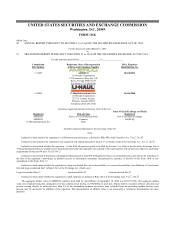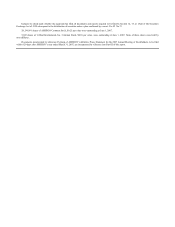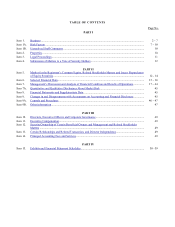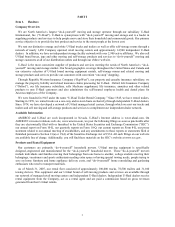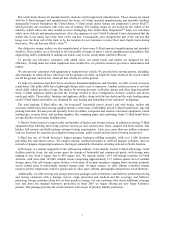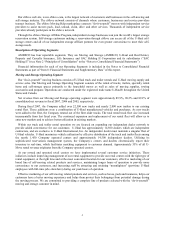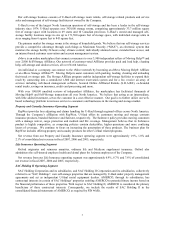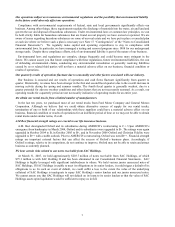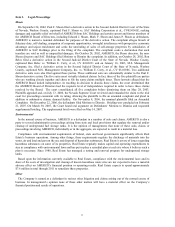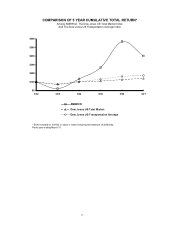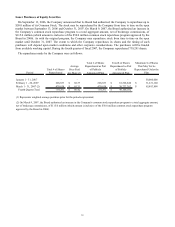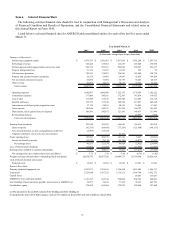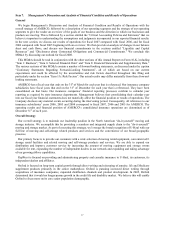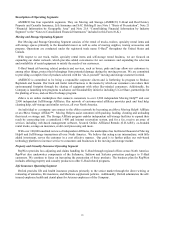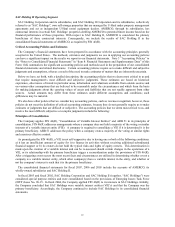U-Haul 2007 Annual Report Download - page 15
Download and view the complete annual report
Please find page 15 of the 2007 U-Haul annual report below. You can navigate through the pages in the report by either clicking on the pages listed below, or by using the keyword search tool below to find specific information within the annual report.Our operations subject us to numerous environment
9
al regulations and the possibility that environmental liability
in
st
d third parties will not have a material adverse effect on our business, financial condition or
O
esult, our
perating results for an entire year.
W
perations for an indefinite period of time or we may not be able to obtain
A
competitors, do not continue to improve, Oxford may not be able to retain and attract
W
its senior lenders or that the value of SAC
Holdings assets upon liquidation would be sufficient to repay us in full.
the future could adversely affect our operations.
Compliance with environmental requirements of federal, state and local governments significantly affects our
business. Among other things, these requirements regulate the discharge of materials into the water, air and land and
govern the use and disposal of hazardous substances. Under environmental laws or common law principles, we can
be held strictly liable for hazardous substances that are found on real property we have owned or operated. We are
aware of issues regarding hazardous substances on some of our real estate and we have put in place a remedial plan
at each site where we believe such a plan is necessary (see Note 17 “Contingencies” of the “Notes to Consolidated
Financial Statements”). We regularly make capital and operating expenditures to stay in compliance with
environmental laws. In particular, we have managed a testing and removal program since 1988 for our underground
orage tanks. Despite these compliance efforts, risk of environmental liability is part of the nature of our business.
Environmental laws and regulations are complex, change frequently and could become more stringent in the
future. We cannot assure you that future compliance with these regulations, future environmental liabilities, the cost
of defending environmental claims, conducting any environmental remediation or generally resolving liabilities
caused by us or relate
results of operations.
ur quarterly results of operations fluctuate due to seasonality and other factors associated with our industry.
Our business is seasonal and our results of operations and cash flows fluctuate significantly from quarter to
quarter. Historically, revenues have been stronger in the first and second fiscal quarters due to the overall increase in
moving activity during the spring and summer months. The fourth fiscal quarter is generally weakest, due to a
greater potential for adverse weather conditions and other factors that are not necessarily seasonal. As a r
operating results for a quarterly period are not necessarily indicative of o
e obtain our rental trucks from a limited number of manufacturers.
In the last ten years, we purchased most of our rental trucks from Ford Motor Company and General Motors
Corporation. Although we believe that we could obtain alternative sources of supply for our rental trucks,
termination of one or both of our relationships with these suppliers could have a material adverse effect on our
business, financial condition or results of o
rental trucks under similar terms, if at all.
.M Best financial strength ratings are crucial to our life insurance business.
A.M. Best downgraded Oxford and its subsidiaries during AMERCO’ s restructuring to C+. Upon AMERCO’ s
emergence from bankruptcy in March 2004, Oxford and its subsidiaries were upgraded to B-. The ratings were again
upgraded in October 2004 to B, in October 2005 to B+, and in November 2006 Oxford and Christian Fidelity were
upgraded to B++ with a stable outlook. Prior to AMERCO’ s restructuring, Oxford was rated B++. Financial strength
ratings are important external factors that can affect the success of Oxford’ s business plans. Accordingly, if
Oxford’ s ratings, relative to its
business as currently planned.
e bear certain risks related to our notes receivable from SAC Holdings.
At March 31, 2007, we held approximately $203.7 million of notes receivable from SAC Holdings, of which
$75.1 million is with SAC Holding II and has been eliminated in our Consolidated Financial Statements. SAC
Holdings is highly leveraged with significant indebtedness to others. We hold various junior unsecured notes of
SAC Holdings. If SAC Holdings is unable to meet its obligations to its senior lenders, it could trigger a default of its
obligations to us. In such an event of default, we could suffer a loss to the extent the value of the underlying
collateral of SAC Holdings is inadequate to repay SAC Holding’ s senior lenders and our junior unsecured notes.
We cannot assure you that SAC Holdings will not default on its loans to


